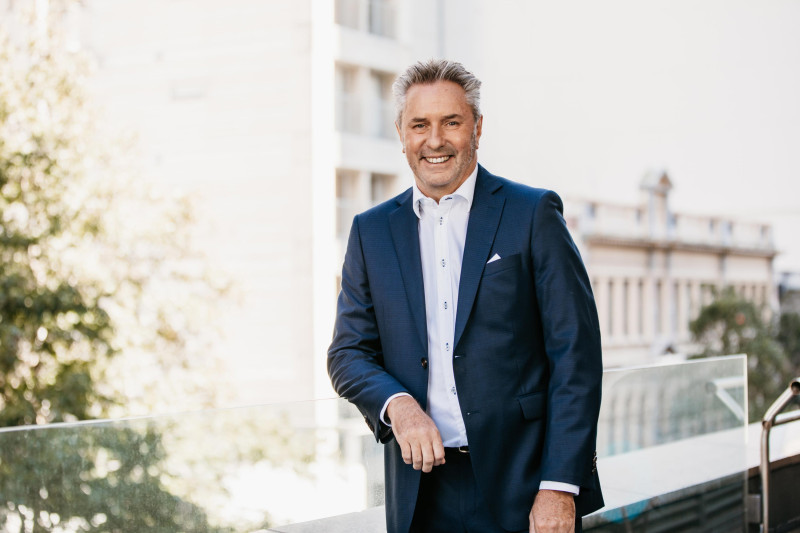
David's Money Story
2 October 2023
Hear David’s Money Story, as he discusses some of the best advice he’s been given and his early experiences with money.
What are your money memories growing up?
Well I’ve been around a long time so my memory is a little flaky. But the big money experiences I had as a very young child was still sitting at the breakfast table counting the milk money that dad had [made], when we had a milk run. So every morning would add up and count all the tokens and the coins, so I was kind of used to money from about five years [old] onwards that I can remember. The other thing that really sticks in my mind was birthdays and Christmas. In those days you would get a card from your auntie or uncle, and inside was a dollar or two dollar note - which was like so much money in those days, so I had a lot of fun with that. One of the things that sticks with me today and I use it a lot when I speak publicly, is some sayings that my mum and dad would give me. They kind of range from a lot of proverbs but the three ones that stick to my mind are: “save a little and spend a little from your wages” so saving regularly, “if you can't afford it wait until you can”, and “if it sounds too good to be true then it probably is.”
How would describe your relationship with money?
Money now, it’s kind of changed the relationship I've had with it, more of a bit of a love and hate to be honest. I love money on the basis that it gives me choices, I was very privileged to come from a family that we talked about money. It was a blue-collar family, it was hard working, but we understood the value of it and those philosophies I carried through the whole of my life. The thing that I noticed as I got older though, is that for a lot of Kiwis, they're not in that privileged position. Money can be a source of stress and anxiety, and if it's not under control can affect not only your financial well-being but your own health and well-being as well.
What experiences that have shaped your money story?
I've had a whole lot of experiences when it comes to money and relationships. The two big things that kind of affected me, the first was going through a separation and thinking about that financially there was a lot to take into account, and to double down on that at the same time, we had a leaky home. So going through that process and identifying how we're going to manage rebuilding a property that was no fault of ours, was very challenging. I guess at the end of it what I realised is, money is important but the things that I'm looking for more now, is using that money for experiences rather than just buying stuff. I guess that's how it's changed my philosophy a little bit.
What advice has shaped your money story?
Along with the moments that my mom and dad shared, what I learned over my life is making sure that you manage your money. To do that, know how much money you actually have and what you do with it, is actually to have a budget, without that it's very difficult to plan. The second thing is kind of what I talked about, [when I mention the] the three buckets: short-term savings, medium, and then long-term. Short-term being for an emergency fund, if something happens where you're out of work for a while you got some money there to kind of smooth out those life bumps. The medium part is really getting a deposit for your home, building a deposit for getting a car or transport. And the third one is really your savings for your future self, which is like your retirement or when you stop work and KiwiSaver as a great place to do that.
How has investing added to your money story?
Investing is something that sounds so boring, and for most Kiwis it's the last thing that you be thinking about. But for over 3.3 million Kiwis that are in KiwiSaver, you're investing already and it brings to life the key principles that everyone should apply if they can over your working life. That is using the power of time and compound, I saw that when I started saving at school banking and putting my $0.20 in a week and then seeing some interest getting accumulated over that period. And making sure you diversify your assets, not having all your eggs in one basket was a big point for me and that's where the best diversification through KiwiSaver investments will get you there in the long term.
Are there any financial goals that you’ve been proud to achieve?
There has been a few actually, I've been very lucky to have a career where I have maintain my income over that period of time. I bought my first house when I was 22 back in Christchurch, it was $60,000 property, which you think wow you won't even get a garage now for that. But in those days it was very hard to get a loan so I was really proud of that. I still remember driving up the drive in my Morris minor, and getting in the house, which only had a couch, a TV from my Grandma, and a bed, and thinking this was one of the proudest moments that I had. Also providing a really good environment and lifestyle for my family. Giving my children hopefully some of the ideas that I was given from my parents. And providing things that perhaps we weren't able to do before, some really good life experiences. They are the other things that really resonate most to me.
What advice you would give your younger self about investing?
I think I was very lucky in respect of a lot of the principles that I applied and understanding the value of money. Probably a couple of things not to buy European cars at 18 or 19 and having to fix them - they're just as expensive as it was running them and buying them in the first place. More importantly, is starting earlier regularly saving and investing in the markets. I think time is one of the gifts that is just so powerful, and using that eighth wonder of the world, being compound interest, and applying that over decades of your life can really get a better outcome. I suspect if I started a bit earlier I might be in a better position than I am today.
What financial goals are you working towards now?
It's funny we always talk about saving money for retirement or accumulating assets. The thing that we don't talk a lot about is actually decumulation. By that, I mean using that money for the purpose of what it is designed for and that for when you're not working and having a career. The first thing I really want is to have a lot more fun, and to do that it means probably three elements, which I'd love to focus on more. Which is to continue renovating our home, the second is traveling, a lot more overseas and enjoying some of those experiences. And the third one, which may be aligned to the second is seeing my top 20 favourite bands of all time playing in venues around the world or in New Zealand so that I can tick them off the bucket list.


